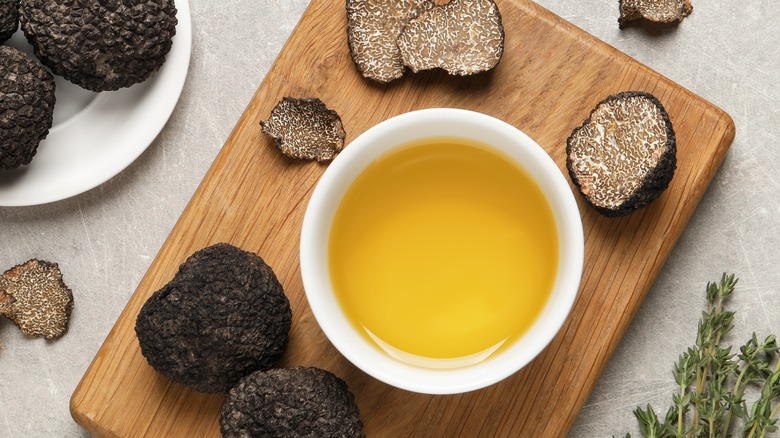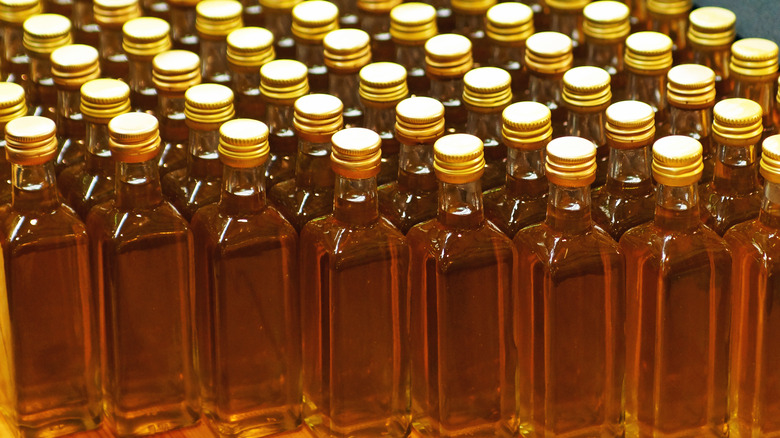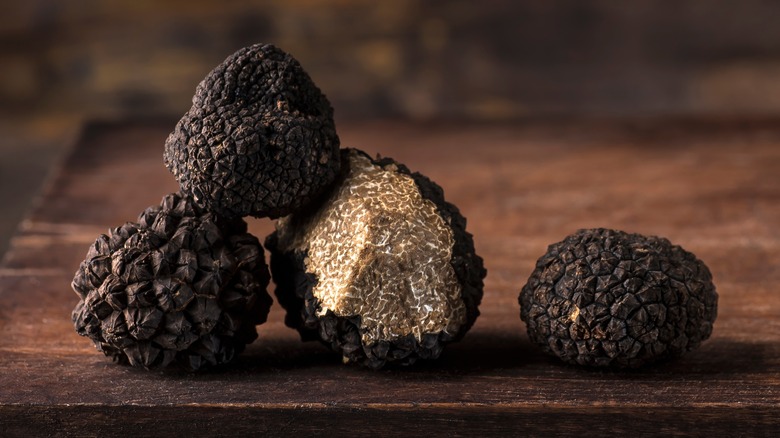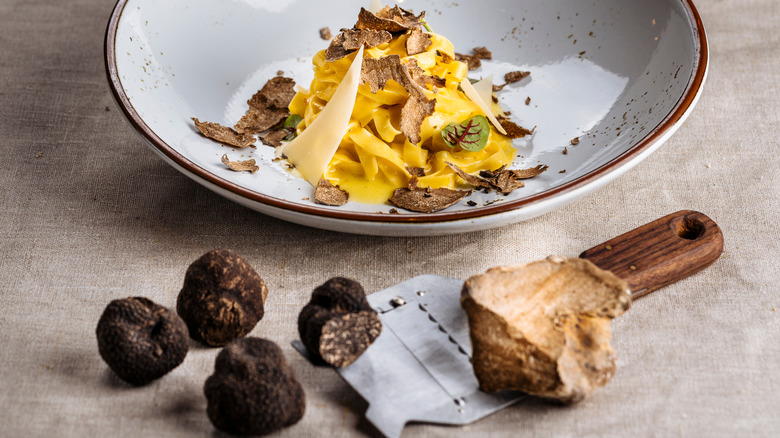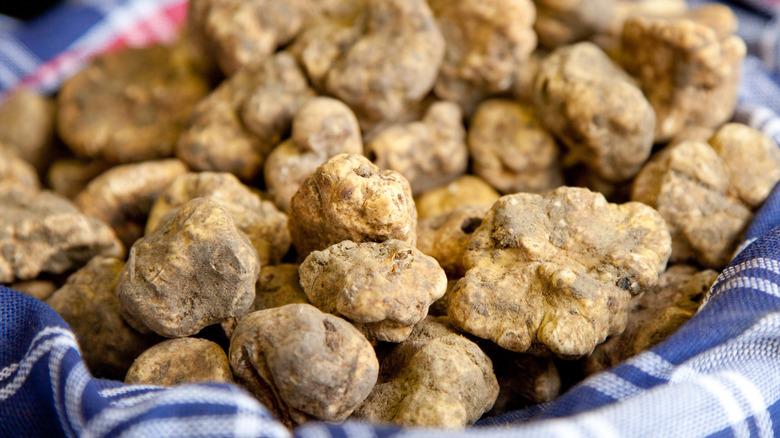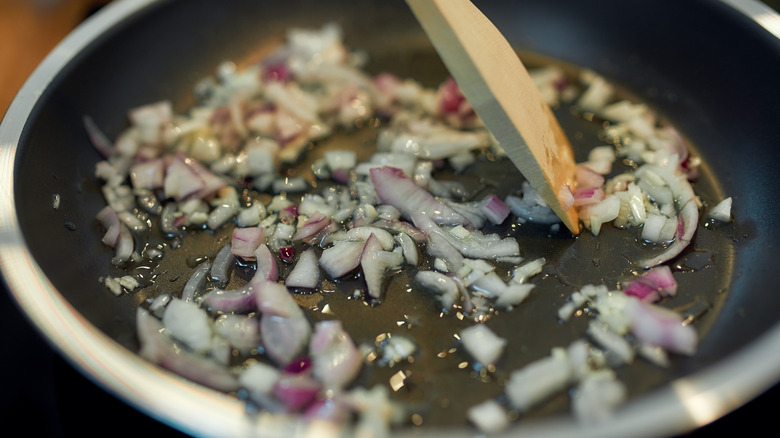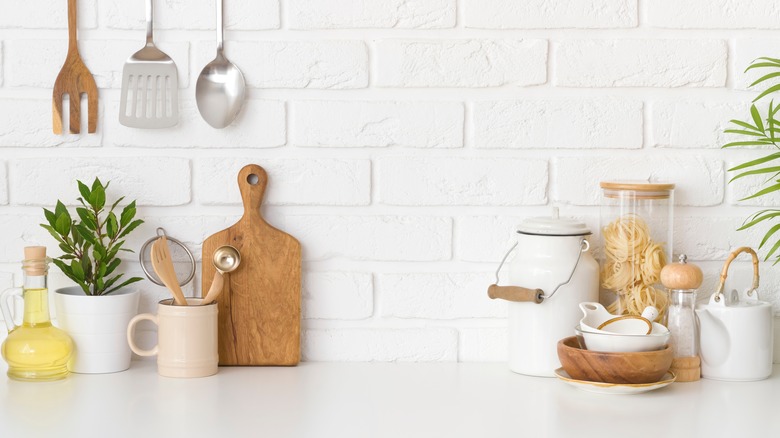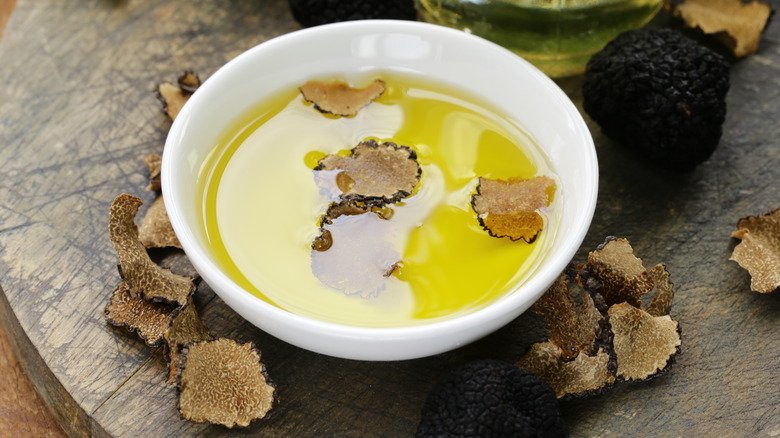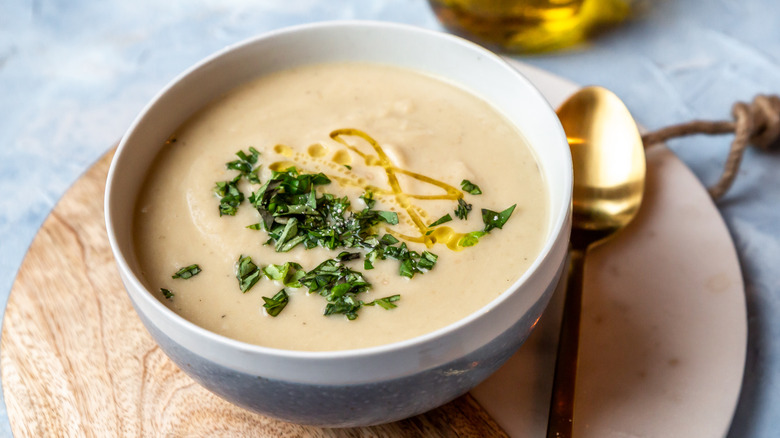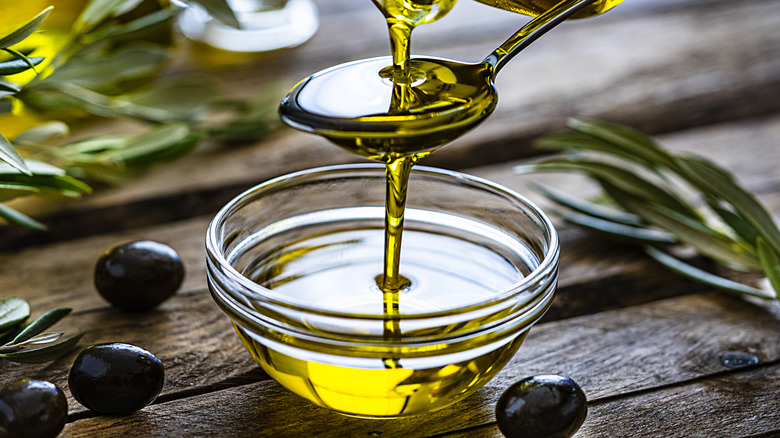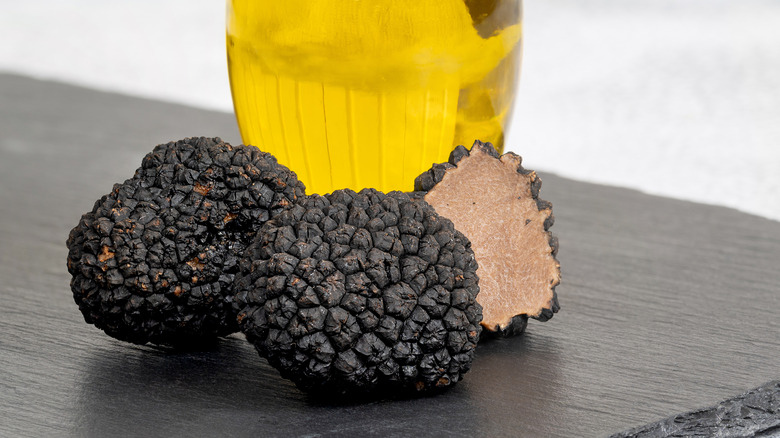Truffle Oil Myths You Should Stop Believing
Unless you've been hiding under a rock for the last two decades, you've probably used — or at least heard of — truffle oil. Whether poured onto pizzas, drizzled over creamy pasta dishes and risottos, or used to dress salads, truffle oil has become a mainstay of contemporary cooking. After all, with a quality oil and a light touch, it's not hard to add something special to a dish.
However, not everything we hear about this popular ingredient is true. While truffle oil certainly has its place in the kitchen, it's important to know what to expect and how to use it. Over the years, a number of truffle oil myths and misconceptions have come about, so people don't always know what to believe about it. It's time we shed some light on the most prevalent truffle oil myths in order to provide a clearer understanding of what truffle oil truly is and how you can make the most out of it.
It always contains truffles
It seems reasonable to expect that a product called truffle oil actually contains truffles, but you could be sorely mistaken. Due to truffles' high cost and limited availability, truffle oils can be produced using synthetic compounds that mimic the aroma and flavor of truffles. In fact, most truffle oils on the market today are made using synthetic flavorings rather than real truffles.
There are a range of compounds that give truffles their distinctive flavor and aroma. These compounds can be produced synthetically, which is cheaper than using real truffles to infuse oil. One of the main compounds responsible for truffles' smell and taste is 2,4-dithiapentane. It's also a main compound in the scent of foot odor and bad breath, which might not sound too appealing — but given how highly prized truffles are, it can't be all bad, right?
In many truffle oils, a blend of synthetic compounds is added to a base oil to create a truffle-like scent and flavor. That's how you can pick up a bottle of truffle oil for a few dollars at a grocery store when fresh truffles can sell for over $200 per ounce.
It never contains truffles
While the average bottle of truffle oil is made using synthetic truffle compounds, you can also find truffle oil made using real truffles. This type of oil is produced in the same way as other infused oils. Basically, pieces of truffle are dropped into oil and left for weeks or months to infuse. After enough time has passed for their flavor to seep out into the oil, the truffle pieces are strained out, and the oil is bottled and sold.
If you're looking for truffle oil with a more nuanced flavor, you should try this type, which is actually made using real truffles instead of synthetic compounds. This oil is sometimes sold as natural truffle oil, but don't assume that any truffle oil contains real truffles just because it's labeled "natural." Some faux-truffle compounds are synthesized from natural ingredients, so manufacturers can justify the natural label even if they don't use real truffles.
Instead, look carefully at the packaging. If it was infused with real truffles, you'll find truffles on the ingredient list. Plus, you're likely to see some copy on the packaging telling you it was made using truffles (since this isn't the norm and manufacturers will want to shout about it).
It genuinely tastes like truffles
If you've only ever tasted truffle oil, you probably don't know what truffles really taste like. While we're not claiming that truffle oil tastes bad, it just doesn't necessarily match the real taste of fresh truffles.
Since a lot of the truffle oils being sold are typically made using synthetic compounds, it seems obvious that they might not really capture the flavor of truffles. While the taste has something in common with the scent and taste of truffles, it's fairly one-note and doesn't give you a true idea of what truffles are like. Where truffle oil is punchy and often does all the heavy lifting in a dish, fresh truffles have a more delicate flavor.
But what about truffle oil made using real truffles? It's somewhat more nuanced in its flavor than its synthetic counterpart, but it still doesn't exactly capture the flavor of truffles. Imagine you had only ever tried basil-infused olive oil, and not fresh basil. You'd probably be surprised by how much brighter, zingier, and more aromatic fresh basil is. An infused oil just can't fully capture the flavor of the ingredient it's infused with.
It has limited uses
Another common myth is that truffle oil has limited uses in the kitchen. While truffle oil is often associated with drizzling it over dishes as a finishing touch, it's far more versatile than that. When you think of truffle oil, you might naturally pair it with Italian food, but you can do much more with it than trickle it over pasta, pizza, and risotto.
If you're looking for more ways to use truffle oil, you have plenty of options. It's great for use in salad dressings, where just a few drops can add a noticeable truffle flavor. If you're looking to level up your potato dishes, a little of this oil on fries or in mashed potatoes turns them from everyday to something special. Adding truffle oil to any mushroom dish intensifies that umami mushroom taste, even if you don't want truffle to be the star of the show. Also, a few drops of this oil on top of a soup can elevate even a basic recipe.
Snacks aren't immune to the truffle oil treatment, either. Tossing popcorn through truffle oil and salt gives you a deliciously savory snack that feels gourmet but takes little effort. You can also simply dip crusty bread into it, which is more delicious than it should be for something so quick and easy.
There's no difference between black and white truffle oil
Some people assume that all truffle oils are the same. But while it's true that oil made using synthetic compounds has a generic truffle flavor, there's a notable difference between black truffle oil and white truffle oil.
Oil made using black truffles has a flavor that is generally described as earthy, musky, and robust. It has a pronounced and intense aroma, often with notes of chocolate, hazelnut, and forest floor. Black truffle oil pairs well with hearty dishes, such as pasta and pizza, adding depth and complexity to the flavors.
Meanwhile, oil from white truffles has a more delicate and garlicky flavor compared to black truffle oil. It has a distinct and aromatic fragrance that is often described as slightly sweet and reminiscent of garlic and shallots. White truffle oil is typically used as a finishing touch on delicate dishes, such as creamy pasta, light risottos, and fresh spring vegetables (such as asparagus).
If you're used to synthetic truffle oil, you might find the robust scent and taste of black truffle oil more familiar. However, white truffles are pricier and more sought-after than black truffles, so you might want to experience their subtle flavor, too.
You can use truffle oil for frying
It might seem like frying ingredients in truffle oil would be an easy and tasty way to infuse them with a truffle flavor. However, you shouldn't use truffle oil for frying, as it's a waste of money and a perfectly good ingredient.
When you heat truffle oil, it quickly loses its truffle flavor, so any food that you cook in truffle oil won't taste like truffles. Frying, sautéing, and roasting in truffle oil are all off the table, as is using truffle oil to marinate ingredients that you intend to cook once they come out of the marinade.
Instead, truffle oil is meant as a finishing oil. This means you drizzle it over dishes that are already cooked or add it to dressings or sauces that don't need cooking and won't be heated. In some cases, this means you need to get more creative than others. For instance, if you don't want truffle oil to make your fries soggy, you could make mayonnaise with truffle oil and use it to dip your fries in.
You should store it at room temperature
Generally speaking, you should store oil away from light and excessive heat without letting too much oxygen get to it. So, you're probably used to storing your oil in a sealed bottle in a dark pantry or kitchen cabinet at room temperature. However, truffle oil is delicate and should be kept in the fridge.
Storing it in a refrigerator instead of at room temperature helps conserve its flavor and aroma for longer. It won't go bad if you keep it at room temperature, but it's worth finding a little space in your fridge to keep it at its best. This is particularly important if you splurged on a pricey oil, or if you only use it occasionally (meaning it takes you a while to get through a bottle).
When you store it in the fridge, you might notice that it goes cloudy or even partially solidifies. This might look strange, but it's perfectly normal and doesn't impact the flavor of the oil. Just leave it at room temperature for 15 to 30 minutes before using it, and the cloudiness and any solid lumps should dissipate.
It loses its flavor in the fridge
Keeping your truffle oil in the fridge keeps it fresh for longer, but some people believe it loses its flavor when refrigerated. Fortunately, this is just another truffle oil myth. In fact, this oil loses its flavor more quickly at room temperature, and is better kept in the fridge.
Truffle oil contains natural fats and volatile aromatic compounds that can deteriorate over time if exposed to warm temperatures or too much air. Refrigeration slows down the process of fat oxidation, helping to stop the oil from becoming rancid, therefore maintaining its freshness for longer. This process also preserves the oil's aroma and flavor for an extended period of time. Additionally, whatever observable physical changes take place in the oil while it's refrigerated (such as changes in color or consistency) will be undone once you take the bottle out of the fridge and let it rest for a bit before use.
There's no problem with making truffle oil at home
Finding quality truffle oil made from real truffles is tricky, so making your own at home may seem like a simple solution. However, if you think there are no potential issues with infusing your own homemade truffle oil, you'd be wrong.
For starters, making truffle oil at home carries a risk of botulism, a rare but serious foodborne illness caused by the Clostridium botulinum bacteria. Truffles, like other mushrooms, can contain C. botulinum spores. When making truffle oil at home, there is a risk that these spores may survive the oil infusion process, particularly when not done correctly. If the oil is then stored improperly or for an extended period at room temperature, the conditions can become favorable for the growth of bacteria and the production of toxins.
Since the bacteria that causes botulism thrive in low-acid, low-oxygen environments, infused oils are perfect for them to breed in. Commercially-made infused truffle oil is treated to prevent this bacteria growth, but if you intend to do it yourself at home, you'll need to take precautions. Because it's the low acidity of truffles that makes them susceptible to causing botulism, one option is to acidify your truffles by soaking them in vinegar before infusing them in oil.
More is always better
More toppings on your fro-yo — great! More blueberries in your pancakes — amazing! But less is more when it comes to truffle oil. It might seem to make sense to douse your dinner in this oil, but it can overwhelm dishes in an unpleasant way.
Truffle oil has a strong, distinct flavor, and it can quickly overpower a dish when used excessively. Due to its concentrated nature, just a few drops or a light drizzle of truffle oil goes a long way. Using it sparingly allows for better balance and harmony with other ingredients, so the truffle flavor enhances rather than overwhelms. Thus, it's best used as a finishing touch or flavor accent rather than as a primary ingredient.
What's more, quality truffle oil can be quite expensive, especially when it's made with real truffles. So, using it in moderation is good not just for the flavor profile of whatever dish you're making, but also for your wallet.
It's always made with olive oil
Many people think that truffle oil is always infused olive oil, but this isn't necessarily true. Truffle oil is an infused oil — it's not an oil made from truffles in the way that avocado oil is made from avocados or sesame oil is made from sesame seeds. However, it can consist of any type of oil infused either with truffles or with truffle flavoring.
Truffle oil is best made with a neutral oil. This lets the flavor of the truffle shine, rather than being overwhelmed by the taste of the oil. High-quality extra virgin olive oil, for instance, isn't a great choice for making truffle oil, because the truffle taste could get lost in the oil's strong flavor. While olive oil is commonly used to make truffle oil, it's best to use a light olive oil with a flavor that won't overpower dishes.
Grapeseed oil is another popular option for making truffle oil. Its light and neutral taste works well for preserving delicate truffle flavors. Other neutral oils that can be used include sunflower oil, canola oil, and avocado oil.
It lasts indefinitely
It's not uncommon for people to think that oil lasts practically indefinitely. This isn't the case, though: Not only can it go rancid, but it can also lose its flavoring, making it less potent than it was when first opened. And truffle oil is no exception.
The shelf life of truffle oil can vary depending on factors such as the quality of the oil, whether it is made with real truffles or synthetic flavorings, and how it's stored. Once you've opened your oil, you should aim to use it up in about 1 to 2 months. It will likely last longer than this before going rancid, but this is when the oil will be at its best. However, it's not just opened truffle oil that eventually goes bad and loses its flavor. Even if you haven't opened the oil, it's ideal to use it within 12 months.
That said, this can vary between brands, so it's a good idea to check the label for specific storage and expiration guidelines provided by the manufacturer. Some truffle oils may have shorter shelf lives, especially if they are made with real truffles, as the volatile compounds responsible for the truffle aroma can degrade over time.
Chefs love cooking with it
If you believe that professional chefs love cooking with truffle oil, you may need to adjust your expectations. Although you'll find dishes finished with truffle oil on some menus, it's more common for chefs to avoid truffle oil.
Not one to shy away from controversial opinions, Gordon Ramsay called it "one of the most pungent, ridiculous ingredients ever known to chefs" in an episode of "MasterChef." Matha Stewart also told Today that she wouldn't cook with truffle oil. She said, "It clings to your taste buds, it's a hideous thing. Forget truffle oil." Additionally, the late, great Anthony Bourdain said, "It's about as edible as Astroglide and made from the same stuff" — not a ringing endorsement.
Basically, although many people love using truffle oil (and it can be effective when used thoughtfully and sparingly), it isn't necessarily a high-end ingredient. Instead, use fresh truffles; they're pricey, but they bring a complex and nuanced flavor you're unlikely to get from truffle oil.
